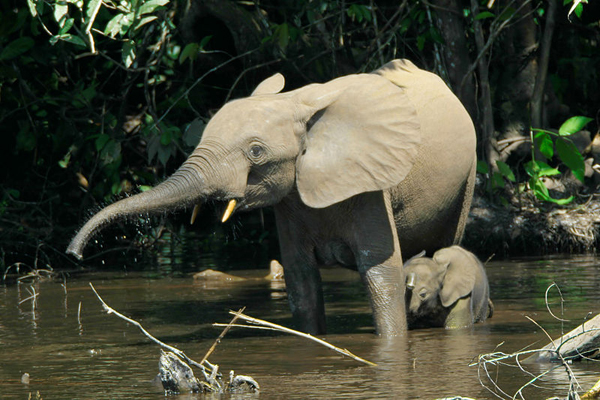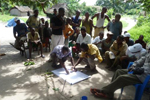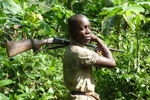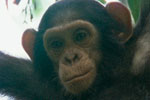Although the Republic of the Congo has opened up nearly 90 percent of its lowland forests to logging, the majority of the logging occurring in the country is still illegal, according to a new report from the Chatham House. In fact the UK policy institute finds that illegal logging in the Republic of the Congo may make up as much as 70-75 percent of the industry.
“There are two main types of illegal logging taking place in the country: ‘informal,’ small-scale artisanal logging for domestic markets (estimated to represent 20 percent of all harvesting); and logging in breach of various regulations by large, licensed
logging concessionaire,” explains the report. In fact, in 2011 an Independent Observer of Forest Law Enforcement and Governance (IM-FLEG) uncovered regulatory breaches at every logging concession it visited.
The Republic of the Congo is one of the most heavily forested nations on the continent: dense forest covers 21.3 million hectares or 65 percent of the nation’s land mass. Yet deforestation is an ongoing and worsening problem. According to Global Forest Watch, the Republic of the Congo lost nearly 300,000 hectares of forest cover between 2000 and 2013. The rate of both deforestation and forest degradation has jumped in recent years, for example forest degradation doubled from the 1990s to the 2000s. Part of this is due to the fact that so little forest in the Republic of the Congo is protected.
 Western lowland gorilla (Gorilla gorilla gorilla) in captivity. This is the subspecies found in the Republic of the Congo. Photo by: Rhett A. Butler. |
“Almost 90 percent of Congo’s lowland dense moist forests are now designated for logging, and logging is already ongoing in two-thirds of these areas,” finds the report. “This is a much higher proportion than is the case in other Congo Basin countries. Most forests in the south of Congo have been logged already and are now undergoing a second or third round of harvesting.”
According to Chatham House, ten companies are responsible for 90 percent of industrial logging in the country. Logging companies are largely targeting okoume (Aucoumea klaineana) and sapele trees (Entandrophragma cylindricum), though both are listed as Vulnerable by the IUCN Red List.
Meanwhile, a rising threat to the country’s forests is palm oil, which means forests aren’t selectively logged for targeted trees, but instead clearcut for monoculture plantations.
“Palm oil is playing an increasingly important role in Republic of the Congo and other Congo Basin countries. The largest new oil palm plantation project in the Congo Basin is in Republic of the Congo,” Sam Lawson, the author the report for Chatham House, told mongabay.com. “The company involved is clear-felling a vast pristine forest populated by gorillas and forest elephants. It has been found to be operating illegally. It has been projected that this one project could double the deforestation rate in the country.”
The palm oil plantation is run by the Malaysian company, Atama Plantation Limited, and is set to cover 180,000 hectares. On its website, the company says it “places great importance on preserving the natural resources and biodiversity of the land while improving the livelihood and ultimately the lives of the Congolese people.”
But Chatham House notes that all wood exports from the Republic of the Congo should be considered “high-risk” unless independently certified. Given the level of suspected illegal logging, the report finds that much of the industry is shifting from selling to sensitive markets like those with recent laws against importing illegally logged wood, such as the EU, U.S., and Australia. Currently, around 60 percent of the country’s timber products is going to China, which is the world’s largest importer of illegally-logged wood.
One bright spot in the country’s industry is its ongoing Forest Law Enforcement, Governance and Trade (FLEGT) Voluntary Partnership Agreement (VPA) with the EU, which ensures that only legally harvested wood enters member states. The report recommends continuing the partnership established under the FLEGT, but also that both the EU and the Republic of the Congo “must recognize that there is a very long way to go, and not water down standards or procedures inappropriately in order to accelerate the process.”
Furthermore, the report recommends that the government better enforce—and increase—penalties for logging abusers as well as redouble tax collection from logging companies.
“It is essential that the government of the Congo steps up its efforts to collect forestry taxes,” reads the report. “The higher revenues from improved tax collection should be used to increase human and technical resources for monitoring and enforcing forest laws.”
Lawson said that illegal logging worldwide—worth an estimated $30-100 billion in ill-gotten gains—is directly robbing communities of their natural resources.
“Millions of people in these countries are dependent on forests for their livelihoods: food, fuel, construction material, medicines, water. When the forests are destroyed or degraded by illegal logging, livelihoods are damaged or destroyed. Illegal logging also fuels corruption and conflict, preventing the country as a whole from developing. The poor stay poor as a result.”

Forest elephants in the Mbeli River, Nouabalé-Ndoki National Park in the Republic of the Congo. Photo by: Thomas Breuer/Creative Commons 2.5.
Related articles
Indigenous people witness climate change in the Congo Rainforest

(03/20/2014) Indigenous communities in the Republic of Congo are observing climate change even though they have no knowledge of the science, according to a unique collaboration between the Rainforest Foundation UK (RFUK) and local communities. The environmental changes witnessed by the locals in the Congo rainforest include increased temperature, less rainfall and alterations to the seasons, much as expected under global climate change.
Orphaned gorillas successfully reintroduced where apes had been hunted to extinction
(10/21/2013) The reintroduction of captive gorillas to areas where they have been hunted to extinction appears to working, suggesting a possible new front in efforts to save great apes, finds a new study published in the journal Oryx.
Elephant killer gets five years in prison in the Republic of Congo
(08/01/2013) The Congolese Supreme Court has ordered Ghislain Ngondjo (known as Pepito) to five years in prison for slaughtering dozens of elephants for their ivory tusks. The five year sentence is the maximum in the Republic of Congo for poaching. Ngondjo was considered the “kingpin” of an elephant poaching group; in addition to killing pachyderms, Ngondjo recruited new poachers and made death threats to park rangers and staff in Odzala National Park.
Deforestation rate falls in Congo Basin countries

(07/22/2013) Deforestation has fallen in Congo Basin countries over the past decade despite a sharp increase in the rate of forest clearing in the Democratic Republic of the Congo, according to a new study published in the Philosophical Transactions of the Royal Society B as part of a set of 18 papers on the region’s tropical forests. The special issue, which was put together by Oxford University’s Yadvinder Malhi, covers a range of issues relating to the rainforests of the Congo Basin, including deforestation, the impacts of global change, the history and key characteristics of the region’s forests, and resource extraction, among others.
Gorilla paradise: new park safeguards 15,000 western lowland gorillas
(01/31/2013) In 2008 the Wildlife Conservation Society (WCS) announced a jaw-dropping discovery: remote swamp forests in northern Republic of Congo contained a stunning population of 125,000 western lowland gorillas that had somehow gone unnoticed by scientists. At the time the President of WCS, Steven E. Sanderson, called the area the “mother lode of gorillas,” and expressed hope that the discovery would lead to a new park. Well, late last year, a park was finalized.
‘Exporting deforestation’: China is the kingpin of illegal logging
-EIA.150.jpg)
(11/29/2012) Runaway economic growth comes with costs: in the case of China’s economic engine, one of them has been the world’s forests. According to a new report by the Environmental Investigation Agency (EIA), China has become the number one importer of illegal wood products from around the world. Illegal logging—which threatens biodiversity, emits carbon, impoverishes local communities, and is often coupled with other crimes—has come under heavy pressure in recent years from the U.S., the EU, and Australia. Each of these has implemented, or will soon implement, new laws that make importing and selling illegal wood products domestic crimes. However, China’s unwillingness to tackle its vast appetite for illegal timber means the trade continues to decimate forests worldwide.
Turning gorilla poachers into conservationists in the Congo [warning: graphic photos]

(08/13/2012) Although founded only four years ago, Endangered Species International-Congo, has ambitious plans to protect dwindling Western gorilla populations and aid local people in the Republic of the Congo. The organization, an offshoot of Endangered Species International (ESI), has been spending the last few years studying the bushmeat trade in Pointe-Noire, the country’s second largest city, and developing plans for turning hunters into conservationists.
Republic of the Congo expands park to protect fearless chimps

(02/16/2012) The Republic of the Congo has expanded its Nouabalé-Ndoki National Park by 37,295 hectares (144 square miles) to include a dense swamp forest, home to a population of chimpanzees (Pan troglodytes) that show no fear of humans. Known as the Goualougo Triangle, the swamp forest is also home to forest elephants (Loxodonta cyclotis) and western lowland gorillas (Gorilla gorilla gorilla). The expansion of the park to include the Goualougo Triangle makes good on a government commitment from 2001.